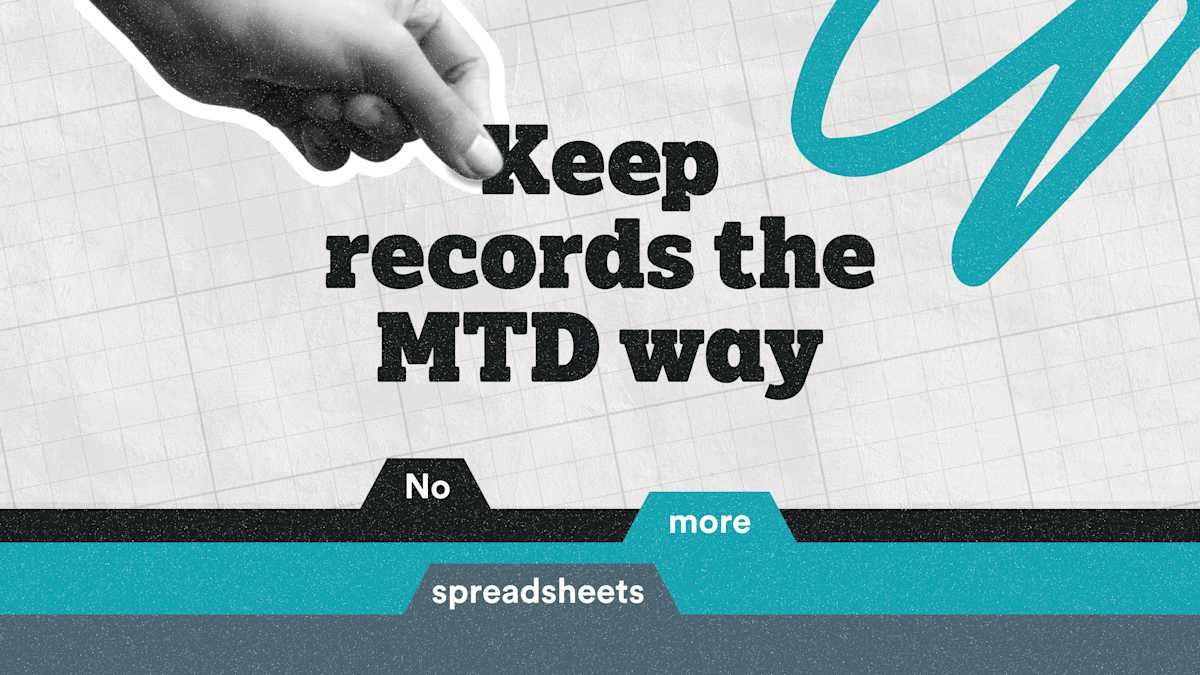For a lot of self-employed people and landlords, this can cause confusion. Does simply typing numbers into an Excel spreadsheet count? Can you still keep your receipts in a shoebox, as long as you photograph them?
The simple answer is that MTD’s definition of a ‘digital record’ is far stricter than just saving files to your computer. It requires a connected system, often referred to as an ‘end-to-end digital link’, which means many traditional record-keeping methods won’t meet the requirements.
If you’re wondering exactly what you need to do to comply, you're not alone. Here, we break down HMRC's specific requirements, why basic spreadsheets are no longer enough, and how using the right tools can help you get tax-confident.
Why the new rules aren't as simple as saving a spreadsheet
The goal of MTD is to reduce errors that happen when people manually copy and paste figures. Because of this, HMRC needs records that flow automatically from one place to the next – something they call functional compatible software.
For MTD, a digital record isn't just a digital file; it's a piece of data that is created, stored, and sent to HMRC digitally.
Here’s a look at the three key components of digital record keeping under MTD:
1. Digital records for income and expenses
You need to record every piece of business income and expense digitally. This includes:
The full amount of income and expenses
The date of the transaction
The type of income or expense (e.g., travel, materials, wages)
Your VAT details (if applicable)
This data must be recorded as soon as the transaction occurs, or as soon as reasonably possible. You can't just tally up your figures once a quarter.
In the Mettle app, you can categorise your expenses and transactions, upload receipts and match them to payments. And with FreeAgent, which you get included with Mettle*, you can sync all your data in near-real time, to generate a tax calculation right in the Mettle app. This will give you a running total of how much tax you’re likely to owe.
2. Digital links and audit trails
This is where the difference between a simple file and MTD-compliant software becomes clear. A digital link is a transfer of data from one place to another without any manual intervention.
What this means: If you use two separate digital tools (e.g. one to record sales and another to manage expenses), the data transferred between them must be linked automatically. Copying and pasting figures from a spreadsheet into your MTD submission software is explicitly not a digital link.
Why spreadsheets often fail: While you can start entering data into a spreadsheet, you must then use bridging software to send that data to HMRC. Importantly, if you manually enter any final figures into the bridging software, or manually cut and paste data between different cells within the spreadsheet before the final submission, the digital link is broken. This makes compliance extremely difficult without specialist technical help.
3. Digital records for receipts
You need to keep a digital copy of the documents that support your transactions, like invoices and receipts. For MTD, HMRC accepts digital images of documents, such as photographs of paper receipts.
The Mettle advantage: This is where digital tools like Mettle can really help. Within the Mettle app, you can photograph your receipts and immediately attach them to the relevant transaction in your feed. This not only keeps a perfect digital record, but also securely links the transaction data (the expense) with the supporting evidence (the receipt) for your audit trail.
Is my current record keeping ready for MTD?
If you rely on any of the following methods, you will need to switch to a compatible system before the mandate comes into effect.
If you currently use... | Does it comply with MTD? | What you need to change |
|---|---|---|
Paper-only records | No | You must switch to MTD-compatible software, like FreeAgent. You can find a list of other software on the government site here. |
Basic spreadsheets | Only with bridging software | Manual copy/pasting breaks the digital link. You'll need specialist, bridging software, or switch to integrated accounting software. |
Old desktop software | Maybe | You must check with the provider to see if they are updating the software to integrate with HMRC's new MTD portal. |
MTD-compatible software | Yes | Your software should manage the digital records, quarterly updates, and final declaration automatically. |
Getting ready with Mettle and FreeAgent
The easiest way to get ahead of the new digital record keeping rules is to use accounting software that is MTD-compliant and seamlessly integrates your business finances.
This is where Mettle could help you.
With a Mettle business account, you get FreeAgent accounting software included at no extra cost*. This combined digital tool takes care of all the MTD requirements automatically, so you don't have to worry about broken digital links or complex spreadsheets.
Automatic digital record keeping: FreeAgent imports all your Mettle bank transactions automatically in near-realtime. This means your digital records are created the second a transaction clears your account.
Simple receipt capture: The Mettle app allows you to instantly photograph and attach receipts to their corresponding transactions. This securely stores your supporting documents digitally.
End-to-end compliance: Because FreeAgent is MTD-compatible, it takes the digital data from your Mettle account and uses it to generate the quarterly updates and the final declaration, which are then submitted directly to HMRC. This ensures a complete digital link without any manual data entry.
MTD is a shift towards modern digital business management. By using smart, integrated software, you won't just comply with the rules – you'll gain a clearer, real-time view of your business finances, helping you feel more confident about tax than ever before.
*To get FreeAgent included, you must make at least one transaction a month from your Mettle account. If you don’t make one transaction a month, or if your Mettle account is closed and you continue to use FreeAgent then the FreeAgent fees will apply. Mettle and FreeAgent have optional paid-for features available.
Information correct as of 29 September 2025.
Disclaimer: The content of this blog is based on our understanding of the topic at the time of publication and should not be taken as professional advice. Any of the information may be subject to change. You are responsible for complying with tax law and if in doubt, should seek independent advice.

